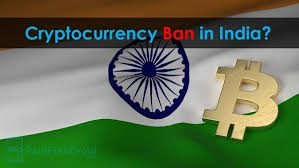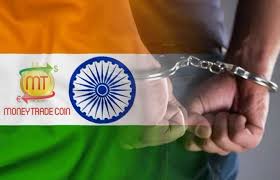India, the second most populous nation on the planet, has formed an inter-ministerial committee to decide the direction of cryptocurrency regulations in the country. In many respects, Indian officials have followed the rulings that have taken place in their neighbor, China, but, considering the softening of global regulators toward crypto innovations, the concept of a ban seems too harsh a position to maintain. These deliberations, however, could be overly influenced by negative publicity generated by a massive $70 million fraud involving an Initial Coin Offering (ICO) and Indian citizens.

The ICO scam was the creation of an entity called “The Flintstone Group”. The mastermind behind this group was a local real estate magnate by the name of Amit Lakhanpal. He and his chief accountant Sachin Shelar were arrested last year, along with two other men. Both men, however, “have since fled the country, perhaps to Dubai or England – however, they remain at large and their exact whereabouts are unknown.”
As for the ICO offering, it appears to have been a “work in progress” for quite some time. Per one report: “The Flintstone Group was able to generate a lot of money from investors by convincing them that a new cryptocurrency called MoneyTrade Coin was in the process of getting legal approval. They were led to believe if they threw more money into the coin, it would raise their chances of owning Caribbean mansions, getting citizenship in African nations and also giving them high ROI when the cryptocurrency finally gets approved by legal authorities. These lies were the bait that led investors to part with tens of millions of US dollars.”
Indian officials have not forcefully banned all aspects of cryptocurrencies, as has their brethren next door in China, but they have tacitly approved of what could be termed a “quasi-ban”. The first inter-ministerial group met in 2017 and suggested that a ban might be appropriate, but no official rulings followed. What did happen was that the Reserve Bank of India (IRB), its central bank, moved aggressively against cryptos. It forbade any bank from allowing a crypto related enterprise to have a bank account, thereby effectively blocking crypto commerce at a critical juncture.
The second committee was formed in 2018 and has already had two meetings. According to The New Indian Express: “A report is likely to be submitted to the country’s Ministry of Finance next month.” Indian investors in cryptocurrencies have become hopeful, due to a leak from an insider on the committee, who said, “There is a general consensus that cryptocurrency cannot be dismissed as completely illegal. It needs to be legalised with strong riders. Deliberations are on. We will have more clarity soon.”
With the ICO fraud dominating press headlines, it is difficult to speculate a positive outcome to these present deliberations. It is also doubtful that events in China will also not have an effect on these discussions. China has been more forceful in its ban of all things crypto, but as some have said, China has a “love-hate-relationship” with cryptocurrencies. In the wake of its total ban, it has continued to fund major blockchain development efforts on a state level and is actually considering a national token, owned and controlled by the Chinese government.
What are the details behind the MTC ICO scam?
The MTC ICO scam hit the headlines on June 5, 2018. Investors, suspicious of a possible Ponzi scheme, alerted police officials. The Mumbai police investigated and then conducted a raid on the offices of the Flintstone Group, which left sixty employees up in the air. Two principals were arrested, but the key masterminds escaped capture and are still on the run. Police reports indicated that the group had been in operation for two years and that local celebrities may also have been involved.

Additional details were soon forthcoming: “The group launched a fraudulent cryptocurrency called Money Trade Coin (MTC), hoodwinking 25,000 investors with promises of massive returns, which, of course, never materialized. The Flintstone Group went to great lengths to convince investors of the legitimacy of their project, posing as Union Finance Ministry officials at one point with fake I.D. cards and back-stories. In the name of the Money Trade Coin project, they even participated in approaching the Delhi High Court to petition the central bank to reconsider its harsh stance against cryptocurrencies.”
The high profile shenanigans did not stop in India. Promoters for MTC needed to create a mystique of credibility to ensure success, a basic step in any multi-million dollar scheme to defraud a multitude of unsuspecting marks. Mr. Lakhanpal used his real estate connections to arrange alleged meetings with the royal family in Dubai. He claimed that his MTC coin would soon be approved by the Ministry of Finance and become legal tender for the express purpose of buying real estate from his offices in the UK, Singapore, Italy, and Malaysia.
One police officer also noted that, “The accused also showed prospective clients an article in an international magazine, which claimed that one of the royals was his partner.” The officer then noted that the publication was used to bring an air of legitimacy to the ICO, thereby drawing in unwitting investors to the trap. The hoodwinked publication was the Middle East version of Forbes, a respected financial periodical. It is uncertain how such a well-known organization would have published a feature length article about an unknown company without first conducting serious due diligence.
The MTC website, although having an impressive look, was missing many of the “must haves” of a legitimate Initial Coin Offering. There was no “whitepaper”, a basic document that all ICOs present as their blueprint for success and reason for being. The absence of this key item was a signal that something was not right. There was no section detailing the management team, and supposed quotes from respectable publications were fakes.
The investigator in charge also said: “Just like an initial public offering (IPO), MTC offered a private initial coin offering (ICO), wherein he invited people and offered coins for just $3 each. Later, he hiked the value of one coin to $6,000, but nobody could cash their investment, as MTC was never listed on any cryptocurrency exchange.” Police subsequently charged all accused of cheating, forgery, and criminal conspiracy as applicable under the Indian laws.
This story, however, is one that keeps on giving. New headlines have broken each time a new arrest has been made or new details came to light. Exact figures for the amount of investor losses have not been made public, although accounts estimate that the figure is somewhere between $70 and $75 million. The five primary suspects remain at large, but a local policeman has recently been implicated in the scam. Dighambar Jangale, an assistant inspector of police in the local police office, is suspected of aiding the crooks in their efforts to dupe investors.
What events in China could also influence the forthcoming decision on cryptos?
The PBoC has never taken kindly to Bitcoin or its altcoin cousins, regarding them as a threat to the financial stability of the nation. The so-called China crypto ban began in 2017: “China has clamped down on virtual currencies since 2017 when the government outlawed initial coin offerings and prevented domestic cryptocurrency exchanges from operating within the Asian country’s economy. But its government appears to tolerate distributed ledger technology on account of its many uses outside of the cryptocurrency realm.”
The more interesting twist, however, is that China did not abandon blockchain technology or the concept of a digital currency completely. The state has continued to finance blockchain development projects. In fact, the Chinese government is ranked fifth in the filing of blockchain related patents, some 78 digital currency patents to date. They are also hiring developers at a quickened pace to support a host of new developments.
The rumor on the street is that one of these efforts will be a government-controlled rival to Bitcoin: “The government of China has been infamously hostile towards cryptocurrency-related economic activities like crypto trading, mining, P2P loans, and ICOs. But this doesn’t mean that the Chinese government disapproves of the underlying idea of Bitcoin. Although Xi Jinping’s administration has done much to kill the domestic cryptocurrency market, it’s currently at work developing its own secure, blockchain-based digital currency.”
The recent meltdown of crypto valuations may have slowed momentum for many of these projects, but work continues. China, nor can India, ignore the potential for innovation that blockchain technology can bring, although it may be more narrowly defined going forward. Hubery Yuming Yuan, CEO of Huobi China, explains: “Blockchain is similar to printing, papermaking, and the internet. It can liberate productivity even though perhaps it does not represent a fundamental technology breakthrough.”
Who serves on the inter-ministerial committee debating the fate of cryptos?
In the meantime, the second inter-ministerial committee is expected to release its report on the fate of cryptos in short order. The group this time around is comprised of representatives from the Reserve Bank of India, the Ministry of Finance, the Ministry of Home Affairs, the Ministry of Electronics and Information Technology, the National Institution for Transforming India, the State Bank of India, the Central Board of Direct Taxes, and the Securities and Exchange Board of India.
While the debate rages, the IRB has distributed its own regulations to banks, codifying its ban on crypto bank account transactions and requiring banks to cease providing any services to cryptocurrency businesses. These rules have already had a direct impact. The one and only crypto exchange in India, Zebpay, had to shut its doors, stating that its business was crippled due to the new rules. If crypto enthusiasts and investors in India are to persist before a reversal of existing policies, then they will need to conduct their commerce outside of national borders with foreign-based exchanges.
Concluding Remarks
Citizens of developing economies of the world want to participate in the digital currency revolution, both in India and China, but local officials are loathe to open the floodgates for fear of national consequences for their respective currencies and financial infrastructures. The world position on cryptos, however, is softening, but ICO related fraud must be contained, if progress is to be made.
Changes are coming in India and China, and changes will no doubt transform the digital currency space into something more respectable and sustainable in the years to come. Hype must give way to concrete applications of real benefit. Per one insider: “As much as I am a believer in the long term disruptive power of blockchain, it cannot solve all the problems in the world.”
Related Articles
- Forex vs Crypto: What’s Better For Beginner Traders?
- Three Great Technical Analysis Tools for Forex Trading
- What Does Binance Being Kicked Out of Belgium Mean for Crypto Prices?
- Crypto Traders and Coin Prices Face New Challenge as Binance Gives up its FCA Licence
- Interpol Declares Investment Scams “Serious and Imminent Threat”
- Annual UK Fraud Audit Reveals Scam Hot-Spots
Forex vs Crypto: What’s Better For Beginner Traders?
Three Great Technical Analysis Tools for Forex Trading
Safest Forex Brokers 2025
| Broker | Info | Best In | Customer Satisfaction Score | ||
|---|---|---|---|---|---|
| #1 |
|
Global Forex Broker |

BEST SPREADS
Visit broker
|
||
| #2 |
|
Globally regulated broker |

BEST CUSTOMER SUPPORT
Visit broker
|
||
| #3 |
|
Global CFD Provider |

Best Trading App
Visit broker
|
||
| #4 |
|
Global Forex Broker |

Low minimum deposit
Visit broker
|
||
| #5 |
|
Global Forex Broker |

Low minimum deposit
Visit broker
|
||
| #6 |
|
CFD and Cryptocurrency Broker |

CFD and Cryptocurrency
Visit broker
|
||
|
|
|||||
Forex Fraud Certified Brokers
Stay up to date with the latest Forex scam alerts
Sign up to receive our up-to-date broker reviews, new fraud warnings and special offers direct to your inbox


